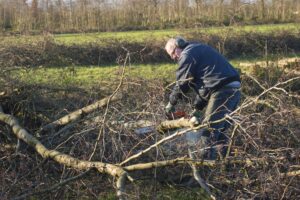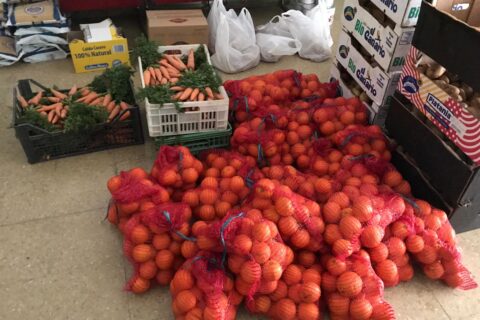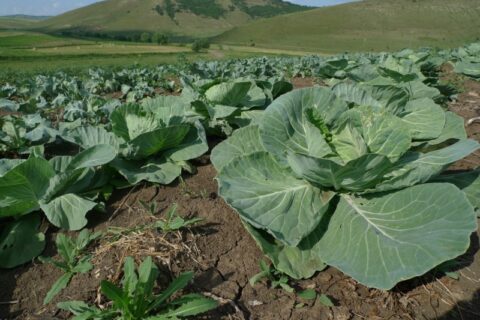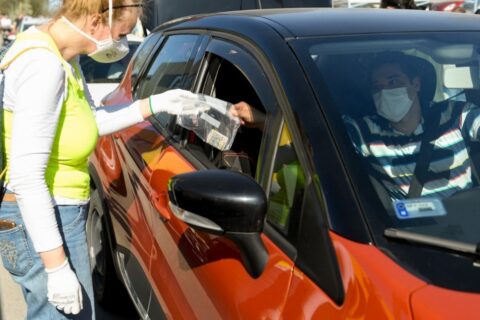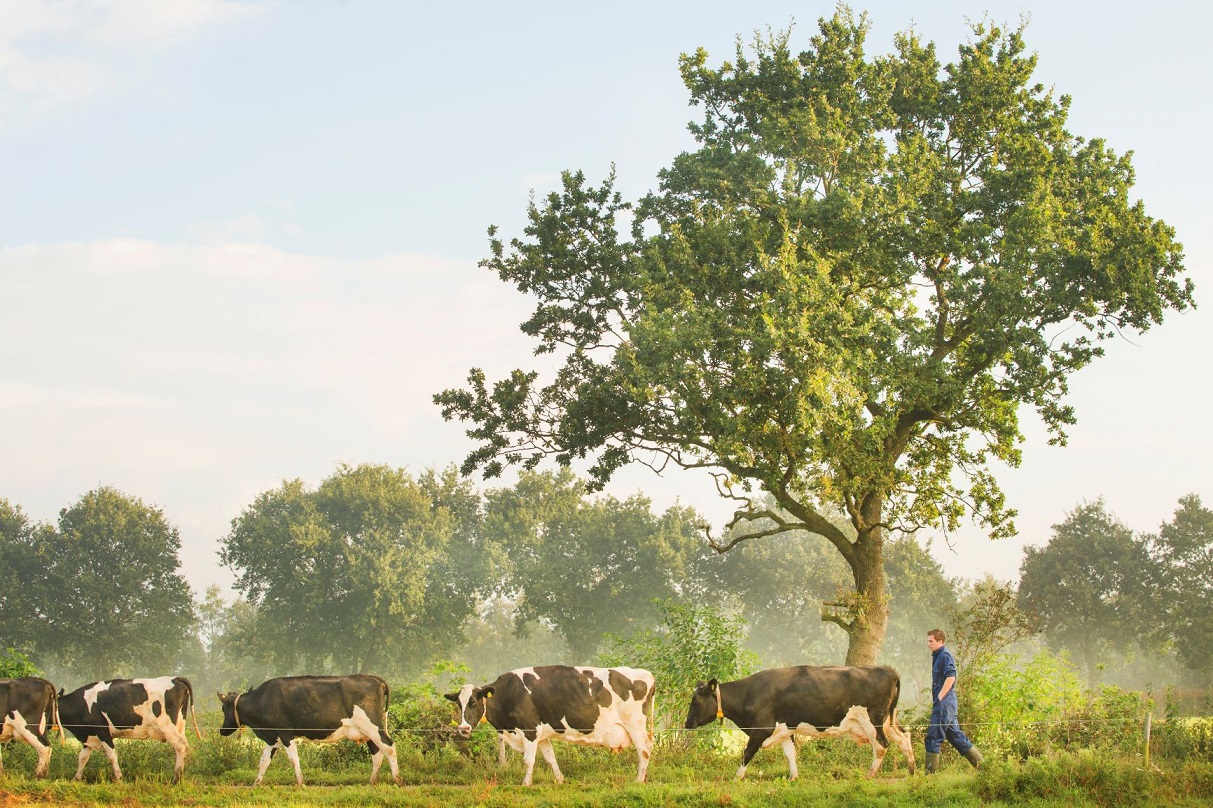
Name of the initiative? Northern Friesian Woodlands Association – NFW (Noardlike Fryske Walden)
Country Netherlands
Region Friesland
What kind of initiative Farming, Educational/training, Biodiversity, Landscape, Policy making
Key words Dairy farms, farmer association, bottom-up
The Story
In the early nineties, following growing concerns around groundwater pollution and acid rain, The Hague imposed new regulations on farmers to protect the landscape and reduce emissions of ammonia and nitrogen. These regulations posed a serious threat to small peasant farms. Injecting manure into the soil instead of spreading it on top would not only bring an increased cost, but more importantly, some farmers suspected the heavy machines necessary would have a detrimental effect on the condition of the soil and the quality of groundwater. In 1992 four men in the northern part of Friesland came together to fight for their farms and their way of life. They were Fokke Benedictus, Pieter de Jong, Geale Atsma and Taeke Hoeksma.
Their message to The Hague was ‘we want to take care of the environment – you have to help us.’ As farmers they wanted to look after the landscape as much as anyone, but they realised that to convince the government, they needed to understand the environmental issues better. They reached out to stakeholders specialising in soil, water, nature, landscape, biodiversity and food so they could present a viable, well researched proposal to The Hague. When they reached out to other farmers they were initially met with opposition, but over the next four years these men were able to win many farmers round and, in 1996 with a membership of 60, the Northern Friesian Woodlands Association (NFW) took their solution to the government. Because they had the scientific backing from universities and nature organizations the government was willing to make a deal with certain exemptions.
“Although there had been agricultural
associations before, the NFW was different.”
Although there had been agricultural associations before, the NFW was different. Where previously each farmer had his or her own contract directly with the government, we were able to have one on behalf of all. We call our big regional agreement with the government ‘the front door’ contract, and at ‘the back door’, we hold lots of little contracts with our members. Members pay 35 euros a year to be part of NFW and agree to deliver their specific activity. They benefit because a farmer is generally not a writer nor an accountant – we have people in the office who can do those things for them. As an association we take responsibility to ensure all members do what has been agreed in their back door contracts so that together we honour the front door contract with the government. Continuing in this way develops trust. This is very important.
As our model of alliance has grown, other associations have formed across the Netherlands. When we first started, The Hague held 18000 contracts with farmers. Since 2016 there are just 40. Every year there is a consultation with the stakeholders/area partners and participants to evaluate how things are going. There is also regular consultation with the government to justify the policy, the approach, and the results achieved and to discuss what improvements can be made for the following year.
“Just as a farm is always developing
our Association is always developing.”
Just as a farm is always developing our Association is always developing. Initially, our agreement with the government focused on landscape, but it has expanded to include biodiversity and education. We must have an innovative approach so each time we negotiate with the government we bring solutions rather than problems. We listen to our stakeholders who understand the trends in agroecology and environmental issues. We have always said ‘measuring is knowing’. If raised nitrogen levels are being blamed on the farms when actually cars or industry is the cause, we need tests to prove our farmers’ methods are not contributing to the problem.
” We listen to our stakeholders who understand
the trends in agroecology and environmental issues.
We have always said ‘measuring is knowing’.”
Tests convince our members as well as the government. We need to show them growing more intensively is not the future. Some of our members think it’s the future – they know there is money for food, but if you produce nature and landscape who pays? So, if we can show that their produce is improved and therefore more valuable, by farming inclusively of nature, their perspective changes. Our dairy farmers learn that maintaining the trees attracts more birds; the birds eat the insects that damage the grass; there is less need for insecticide; the cows consume fewer chemicals; and their health is improved.
Our newest focus is our field laboratories. We have teams on the farms testing innovative ways of production, to see which methods are the most inclusive of nature. Since 2015 CAP (The Common Agricultural Policy of the EU) offers subsidies to collectives for nature and landscape management. If we can prove certain ways of farming actually help our governments and municipalities solve part of the climate problem, we can receive money for further innovation. We are planning 150 projects over the next 5 years. The more we discover as we work with Wageningen University and our farmers around agroecology, the more we can hope to influence policy in the Netherlands and even across Europe.
“We are planning 150 projects over the next 5 years.”
A few weeks ago, we took a group of primary school children out of the classroom and into the fields. Together we built little wooden houses and taught them how to keep the landscape in shape – about insects and other wildlife. These children know what a computer is, but they have never seen a cow! Once home they can share their day with their parents and other members of the family, and just like that, new connections are made across generations.
“These children know what a computer is,
but they have never seen a cow!”
Now within the province of Friesland we have 800 members, not only farmers but inhabitants who support what we do. They receive regular news and information via newsletters and meetings in the fields. We don’t have a lot of membership turnover, mainly farmers leave NWF because they retire, or their farms grow very big. And there is a cost to leave.
Our goal continues to be healthy farming, within the community, in balance with the environment. Alongside this are our five core values: trust, transparency, communication, working from the heart and knowledge.
“NFW has a long history of establishing
trust with the government and with our members.
It’s a bottom-up model“
NFW has a long history of establishing trust with the government and with our members. It’s a bottom-up model – the farmers resent being told how to do things by the government, but our Association empowers and encourages them to have personal ambition for our region. They can work with the scientists making suggestions from their experience on their farms and the passed-down knowledge from their ancestors – they have an opportunity to show the government how they can make things better. We have a word in the Frisian language: Mienskip. It loosely translates as community, but more fully it means joint use, and/or joint action to achieve something – being responsible for something together and jointly ensuring that things are successful. This approach has always worked well for us, so we continue to use it.
Additional information
https://www.noardlikefryskewalden.nl/
Facebook / twitter / instagram @VerenigingNFW
—
Repository compiled by: Noardlike Fryske Wâlden
E-mail contact: secretaris@noardlikefryskewalden.nl

